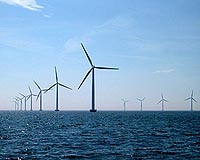 |
Washington DC (SPX) Jun 29, 2009 Forget your old-fashioned ideas about the solid waste industry. It's not just about hauling garbage anymore. So said Bruce J. Parker, president and CEO of the National Solid Wastes Management Association (NSWMA), in a speech today to the Society of Government Economists in Washington. NSWMA represents the private sector solid waste industry in the United States. "Most Americans probably don't recognize today's garbage industry for who we really are - one of the most environmentally responsive and innovative industries in the nation," said Parker. "The nearly 400,000 American men and women who work in the public and private sectors of our industry - in positions as varied as haulers, mechanics, civil engineers and environmental scientists - have long moved beyond simply picking up trash." "Americans throw out more than 250 million tons of garbage each year. Our industry continues to protect public health and the environment by managing this waste," Parker said. "But in recent years, we've pioneered technologies that have changed the ways we deal with our trash. We've invested tens of millions of dollars, not only to modernize landfills and boost recycling rates, but also to cut greenhouse gas emissions and air pollutants, and find renewable sources of energy that reduce our dependence on fossil fuels." Parker pointed to waste-based energy projects, which turn household garbage into clean, renewable energy. In addition to 87 waste-to-energy facilities operated by the industry - generating enough electricity to power 1.7 million homes - it also operates 470 landfill-gas-to-energy projects that provide electricity and heat for corporate and government users in 44 states. The U.S. EPA has identified an additional 520 landfills across the nation as potential candidates for similar energy projects. "Landfill-gas-to-energy projects also address global warming by capturing methane, a potent greenhouse gas," Parker noted. The EPA estimates that using methane as renewable, "green" energy brings environmental and energy benefits equivalent to eliminating the carbon dioxide emissions of 195 million barrels of oil a year. The Intergovernmental Panel on Climate Change (IPCC) has noted that landfill-gas recovery directly reduces greenhouse gas emissions. Other industry initiatives include working with truck manufacturers to develop more fuel-efficient vehicles, investing in the development of alternative fuels such as biodiesel, compressed natural gas and ethanol, using renewable sources of energy such as solar to power compacting equipment, and placing solar panels and wind turbines on landfills to produce even more energy. "Increasingly, the industry is relying on cleaner-burning fuels to power our fleet of 130,000 trucks," Parker said. "We're also looking toward hybrid technology to further reduce greenhouse emissions and improve air quality." Recycling and composting offer another important environmental success story, Parker said. The industry processed recycling for or composted slightly more than one third of all municipal solid wastes in 2007, conserving precious resources, protecting air and water from potential pollution and leading to a 2.5 percent reduction in America's total greenhouse gas emissions, according to the U.S. EPA. "The solid waste industry is proud of its environmental achievements, but there is much more to do. Our collective efforts have made a difference, and we continue to raise the bar," Parker said. Share This Article With Planet Earth
Related Links National Solid Wastes Management Association (NSWMA) Powering The World in the 21st Century at Energy-Daily.com
 In bid to go green, U.S. can look to Danes
In bid to go green, U.S. can look to DanesCopenhagen, Denmark (UPI) Jun 26, 2009 In its bid to boost the share of renewables to a quarter of the U.S. energy mix, Washington can look to Denmark as an example of how to integrate fluctuating green energy sources. The Middelgrunden wind park, a curved row of 20 2-MW Siemens turbines, is the world's first profitable offshore wind park. Owned and operated by Denmark's Dong Energy and a consortium of 8,600 private sharehol ... read more |
|
| The content herein, unless otherwise known to be public domain, are Copyright 1995-2009 - SpaceDaily. AFP and UPI Wire Stories are copyright Agence France-Presse and United Press International. ESA Portal Reports are copyright European Space Agency. All NASA sourced material is public domain. Additional copyrights may apply in whole or part to other bona fide parties. Advertising does not imply endorsement,agreement or approval of any opinions, statements or information provided by SpaceDaily on any Web page published or hosted by SpaceDaily. Privacy Statement |